I recently got into Android Netrunner. It is a card game by Richard Garfield of Magic: The Gathering Fame. It used to be a Trading Card Game itself but never succeeded in that format. It was recently re-released as a so-called “Living Card Game” and is currently enjoying a great deal of attention. I noticed that especially Game Designers are quite fascinated by it. Here are some of my observations.
The first time I heard about the game from Nels Anderson on the Idle Thumbs podcast. It caught my attention but not enough to follow it up. In the subsequent months I stumbled over it a couple of times until I gave in and bought the Core Set. Ever since I started visiting the local Netrunner meet-up and began collecting the expansions. I even started playing the game on OCTGN. I was pleasantly surprised to find out that in the meantime, Nels himself started his own Netrunner podcast on Idle Thumbs. Also, Quintin Smith from Shut Up And Sit Down seems to have caught the Netrunner virus as well.
Theme and Flavor
To me, one of the core Aspects of Netrunner is its elegant portrayal of its theme and the rich flavor it radiates. Netrunner is a card game duel very much like Magic: The Gathering. But instead of generic fantasy wizards, it portrays a much more specific Cyberpunk world. One player plays a hacker. The other player plays an evil corporation. The corporation protects their computer servers with security software to fulfill their mischievous secret plans. The hacker’s job is to hack into the servers and to steal the corporation’s secrets. This may not sound that different from Magic, but the actual execution of that setting really hits home. In Magic, the theme is really just a thin, loose veneer over an intricate rule set. It is never really evident how individual cards really portray a confrontation between wizards. What actually happens when you play a land card? Where do all those weird creatures come from? What does it mean when that bird does 2 damage and how come just one of those birds can kill two trained soldiers? The Magic experience is not caring about such minutia and enjoying the interplay of rules while soaking in the vague hint of the fantasy setting.
Netrunner offers an experience where rules and setting are much more tightly interwoven. For Hackers, cards represent their software, their hardware and their underworld connections. For Corporations, the cards represent their security software, their secret agendas or expert employees. Various game elements have special names. The corporation’s draw deck is called “R&D” because that’s where all the new stuff is coming from. The discard pile is called “Archives”, the hand cards are called “HQ”, cards on the table are placed in “Remote Servers”. It sounds goofy and confusing at first, but it actually contributes to a thematically more meaningful gameplay.
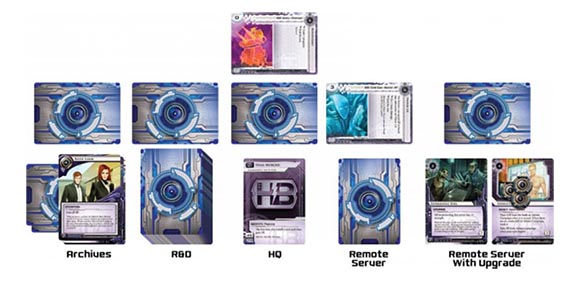
All elements of the game have themed naming conventions. They seem goofy at first, but they show how well the the rules and theme are interwoven.
One interesting improvement of the new edition over the original TCG is the inclusion of factions. As a hacker, you are not just an anonymous hacker, you have an identity which belongs to one of 4 factions. You can be the Akira-esque child hacker Chaos Theory, part of the playful group of “Shapers”. She can install more programs than others and can use a smaller deck of cards because she is still a child playing around with just her favorite playthings. Or you can be Andromeda a high-class “Criminal”, who starts the game with 9 instead of 5 cards because she is exceptionally wealthy and has a great amount of resources at her disposal. Depending on the identity, the play style and the actual deck can be completely different. At the same time, the identities also bring with them a specificity to the portrayed conflict.
But in the end, what really gets me is the rich flavor the individual cards bring with them. Flavor can be a difficult concept to grasp – often it can be one of those “I know it when I see it” aspects of a game. Netrunner oozes Flavor. Each card is incredibly evocative – either by portraying the world Netrunner plays in or by depicting a very specific story beat. Together they are capable of stinging together surprisingly coherent narratives. A hacker may start a self-destructive drug-induced Stim Hack to get an edge over a particularly well defended server, sustain brain damage the process and use Public Sympathy to get back on her feet. Meanwhile characters like Director Haas from the Corporation “Haas Bioroid” are depicted on multiple cards fleshing out the lore of a ruthless CEO, who always gets what she wants except when it comes to her spoiled Playboy son.
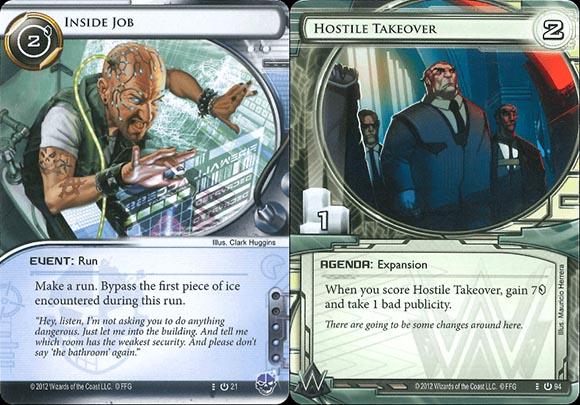
The Hostile Takeover took too long and was prevented with an Inside Job run on a server that was previously thought of as hack-proof. How will the board of executives react to the bad news?
Fundamentally, none of this new or unique. The exceptional thing about it is the actual execution. The pieces seem to fall together much more easily than in TCGs like Magic. The effect can be intoxinating.
Asymetry
One extraordinary aspect of the game’s design is its inherent asymmetry. The two players don’t just play different factions, they actually play according to completely different rules with different goals. Corporations secure servers, hackers break into them. One player builds a puzzle. The other player has to solve it. It is a game design paradigm reminiscent of Little Big Planet or Jason Rohrer’s The Castle Doctrine except that the design and testing of a level are framed as an confrontational duel and happen simultaneously.
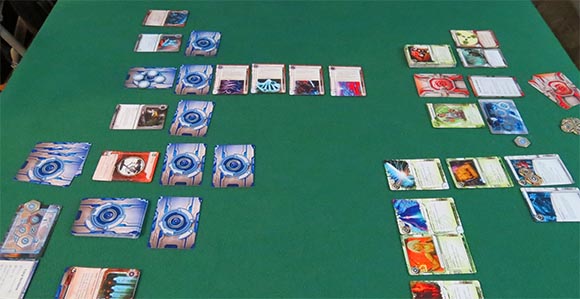
Depending on which side you play as, the game experience can be radically different… at yet they share common themes.
A friend of mine tried the game but was put of by it, specifically by the asymmetry. It struck me that this particular feature could be one of the reasons why the game is more appealing to Game Designers. To some extent, it can be much easier to design and balance a duel game where both players have the same abilities. As soon as one player has an ability the other one doesn’t, you need to counter-balance. Not only do you have to preserve a sense of fairness, it is also important to convey a comparable level of depth and engagement in what is essentially a second iteration on the game. It would be easy to accidentally end up with a game where one payer does all the work and has all the fun while the other just blindly draws and plays cards. So when a game comes along that successfully pulls of that difficult balance act, it often enjoys is a certain sense of respect and awe from the game design connoisseurs. I believe that this is one of the reasons for Starcraft’s sustained success and it think it plays a role in how Netrunner is percieved.
Affordances
As a side note, there is minor thing that struck me about Netrunner. I really appreciate how Richard Garfield leverages the affordances of playing cards as objects to design his games. In Magic, the tap mechanic was a clever and simple way to indicate if a card’s ability has been used. In Netrunner, cards protecting the server are placed sideways, indicating they are in the way of the invading player. The Corporation plays all cards face-down because they are secretive. The cards are then dramatically revealed during runs not unlike the trap mechanic in Yu-Gi-Oh. The hidden information introduces bluffing as a cornerstone of the corporation strategy.
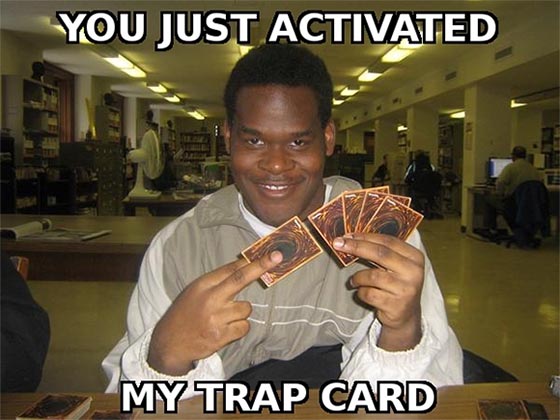
“Ummm…. I mean I rez that ice.”
There is also a beautifully elegant way of tracking a player’s “health points” – they are represented by the number of cards the player has in their hand. If a player gets injured, they have to drop cards randomly. This has the potential to ruin a carefully developed strategy, so even on an emotional level, it actually “hurts” the victim. It also makes healing more straight forward – just find a way to draw more cards. On a practical level, it is not even necessary to keep track of some health-points or health-tokens. The number is always evident for both players.
Meta Game
One of the most striking differences between the 1st edition of Netrunner and the most recent one is it’s publishing format. The original edition was a Trading Card Game very much like much like Magic – players bought a starter pack which they could upgrade by buying booster packs. All packs contained random cards. So each player would have a different pool of cards at their disposal, which they would develop strategies around. This eventually was supposed in creating more variety. Magic was a game where the surprise and novelty came often from dealing with cards you’ve never seen before. The new Netrunner edition is being released as a so-called “Living Card Game” – a new model introduced by the publisher Fantasy Flight Games. It seems to be an evolution of the recent board game success Dominion. Players start out by buying a large, board-game sized (and priced) box containing a wide selection of specifically selected cards. With those cards, they are able to play a completely satisfying game. There are even enough cards inside to mix things up – to construct different decks that keep the experience fresh and new even using the same set. However, Fantasy Flight also releases expansions for the game. Unlike traditional board game expansions, they are actually very cheap (around 10 eur) and small. Also, they are released on a frequent schedule – a new pack is released every month or so.
This solves a certain problem that occurred with Trading Card Games like Magic. Especially with the advent of eBay, it was possible to buy yourself a victory. If you invested enough money, you could get this specific combination of rare out-of-print cards that would basically guarantee victory in most cases. As the number of cards increased, this got really out of hand in Magic. Soon the creators started restricting which cards are legal in tournaments or even went on creating tournament formats like Limited, where you would buy random card packs at the tournament and construct decks out of those.
The Living Card Format sidesteps that issue altogether by making all of the cards readily available. There are no random packs. So if a card turns out to be exceptionally powerful, it is quite easy to just get that expansion and start using it yourself. Of course, this is still a way to pull money out the player’s pockets, but it no longer follows that Las Vegas philosophy of an endless money sink. Now, it is much more reminiscent of a TV series, where you would buy the next season on DVD because you really liked the previous one.
As a additional side effect, there seems to be a lot more focus on the meta game. Be it on podcasts, websites, YouTube channels or in conversations at a local game store, the Netrunner community is in the state of a constant discourse over strategies and deck building philosophies. Cards, decks and strategies go in and out of fashion. Of course, this is again no different from Magic. However, in Magic the meta-game was something with a high entry threshold – in the form of the sheer number of cards and the financial burden associated in getting them. The meta-game in Netrunner accessible, even more accessible than the meta-game of something like Starcraft 2. Even the most advanced tournament decks are still playing a lot of cards from the core set. Just after 3 games I was able to at least partially follow YouTube recordings of regional matches.
The Living Card format seems to mirror a certain sentiment among the digital games. It is a design philosophy that voluntarily avoids exploitative Whale-farming strategies that seek at creating hyper-obsessive players to fuel their business model. Instead, it focuses on more healthy, small-scale, content-centered communities. It benefits from a wider causal appeal, lower entry thresholds and more world-of-mouth publicity. Because the strategy puts the game content rather than the business model in the spotlight, I believe it is coincidentally also a philosophy game designers appreciate in particular.
Thinking Man’s Game
Finally, there is one aspect of Netrunner that stands out when compared to Magic. It requires a lot more strategic thinking. This is something the Terminal 7 podcast already commented on. Magic is 70% deck building and 30% actual play. Netrunner is 30% deck building and 70% actual play. Magic can be a very streamlined experience. Draw a card, tap a card, play a card, next turn. A good deck will play itself. The mana curve often trims down decision trees into obvious low-hanging fruits. Of course, this makes the game so addictive at the same time. The recent Hearthstone game by Blizzard expands that concept even further – it is essentially an even more streamlined Magic. It’s Magic Blitz. Netrunner, is everything but that. Turns in Netrunner feel slower. Actions play out over multiple turns. Strategies can take a whole game to pay out. Each turn consist of 3 – 4 individual actions. Each of these actions can be chosen from a whole menu of available ones. One turn you will play a magic-style draw a card, play a card game. Another turn you won’t draw cards at all and just save up money. Another turn may take ages as you carefully inch yourself forward into a fortress of a server.
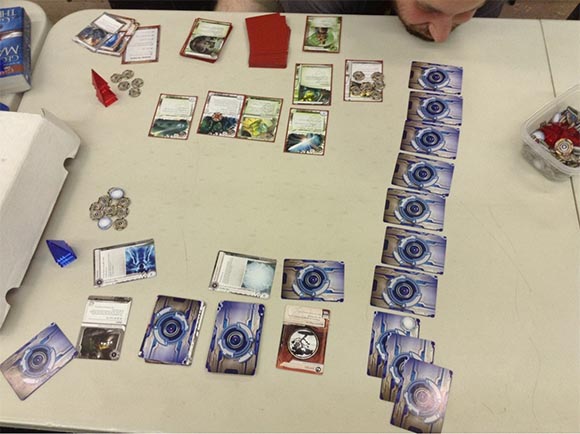
Those guys are in for a looooong game. Oh wait!
And then suddenly an unexpected card appears and you just can’t believe it’s over like that. It is not a streamlined experience but a complex Breakbeat Staccato Improv piece in which you are at the instrument. It can feel awkward and daunting at first. But it is also immensely satisfying once you find your jam. And every game feels completely different.
The Netpicks
Among all the praise there are also some negative aspects to Netrunner. I don’t want to go too deep into them at this point since this article is so long as it is. But here are some bullet points:
-
Core Set has TCG leftovers – In all of the expansions you always get 3 copies of every card. That’s because when you build decks, the maximum number of copies of a card you can include is 3. However, the core set is an exception. It contains some cards with just 1 or 2 copies. If you want to build build decks more freely with those cards you need to buy multiple core sets… but then you have to pay quite a sum and end up with a lot of unnecessary cards. It just feels like a step back to the Rare/Uncommon/Common random card pack paradigm of Trading Card Games. Also, it hurts my OCD. The Core Set should have had 3 copies of each card or at least there should have been a “Deckbuilder’s Kit” expansion.
-
Hard to Learn – Asymmetry, Flavor and Strategic Depth are great. But they also mean the game is hard to learn. Both sides play according to different rules. And you need to learn both to play just one side. What was “Grip” and “Stack” again? Why do the same things have different names for Corp and Runners? Even if you get the rules, it can be initially difficult to figure out what to do. Magic’s streamlined game-play meant it was easier to learn. With Netrunner It can take a whole evening and a few games to start figuring things out. There is a good manual and a video tutorial. But a game of this complexity requires an extra mile or two.
-
Long – Some Netrunner games can last over an hour. There can be phases where it feels like neither player is getting anywhere. This causes some difficulties in tournaments. Again, Magic has a certain advantage there. It is shorter and pacing seems to be more consistent.
-
Baroque – I mentioned the elegance of some elements. Not all of them feel as elegant. Some rules and systems feel outright baroque. The Trace system is a good example. One could easily imagine the game working similarly well without it. It could have been a new mechanic in an expansion. It’s not necessarily bad. Once you figure it out, it opens up another strategic dimension. It just doesn’t feel as essential and integrated as other elements and it slows down learning.
-
Catching up can be Daunting – While the meta-game discourse is easy to get into compared to Magic, there is still a certain threshold to it. New expansions are released frequently. As a newcomer, one can get a bit overwhelmed with all the packs you need to buy in order to catch up to the rest of the scene. Again, it feels like getting into a TV series that is well into the 3rd season or so and you have to binge-watch to be able to discuss the current episode with your co-workers. However, unlike Magic, it is actually possible to eventually get there without ruining yourself. And in the end, it’s more of a psychological pressure. Deck-building is far less crucial in Netrunner than in other TCGs, so a newcomer can just play the core set decks and do perfectly well against opponents with a larger card library.
-
Doesn’t Draft so Well – I mentioned Limited formats like Booster Drafts. Those don’t work so well in Netrunner. Which is a bit sad, because I really enjoy them. Fantasy Flight is working on a workaround and I’ve seen some gaming stores coming up with their own solutions. But it’s not a natural way to enjoy this game.
As it’s often the case, the nitpicks make the game actually a bit more attractive to me. I find myself thinking about how to fix the issues. How would I tweak the rules to speed things up? How would I design a good tutorial? Which rules would I explain first? I’m not the only one – some people even build tutorial decks to simplify teaching the game to players.
As already mentioned, I think there are multiple aspects of Netrunner that end up making it especially appealing to Game Designers and Game Design Connoisseurs. It’s asymmetric, complex and deep and yet compact and elegant in some regard but then long and awkward while oozing with theme and flavor. It is casually accessible because you can just buy it in a box like a board game and yet it requires an above-average dedication when learning to play it. And once you start playing it on OCTGN you realize you’re dealing with a beautiful train wreck and enjoying it thoroughly. So chug that Diesel and jack into that rabbit hole. It’s going to be a wild run.






Great piece. When you create a good tutorial please let us know. I know how to play but just barely. OCTGN scares the living crap out of me. It comes with its own learning curve which requires time to overcome.
I really wish for a solo experience on a tablet much like MtG Duels of the Planeswalkers.
Some of the lag is inevitable due to the strategy, but Netrunner sessions might finish faster with well-tuned and good 45 card decks rather than large decks w/o a focus.
Agreed about “hard-to-learn” and Tracing being baroque.
Still great review for a great game.
Great article! And I agree, seems like a lot of game designers love the game (me definitely included). Will be fun to be able to bring a deck to conferences and stuff like that
[...] of that makes sense. Netrunner’s a fun game but it’s a very much a gamer’s game perhaps even a game designer’s game. There’s jargon and terms that make it slightly difficult to explain the game to those who [...]